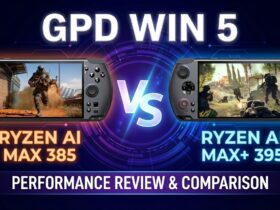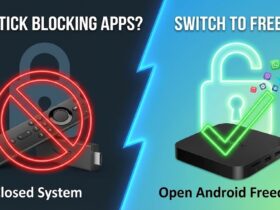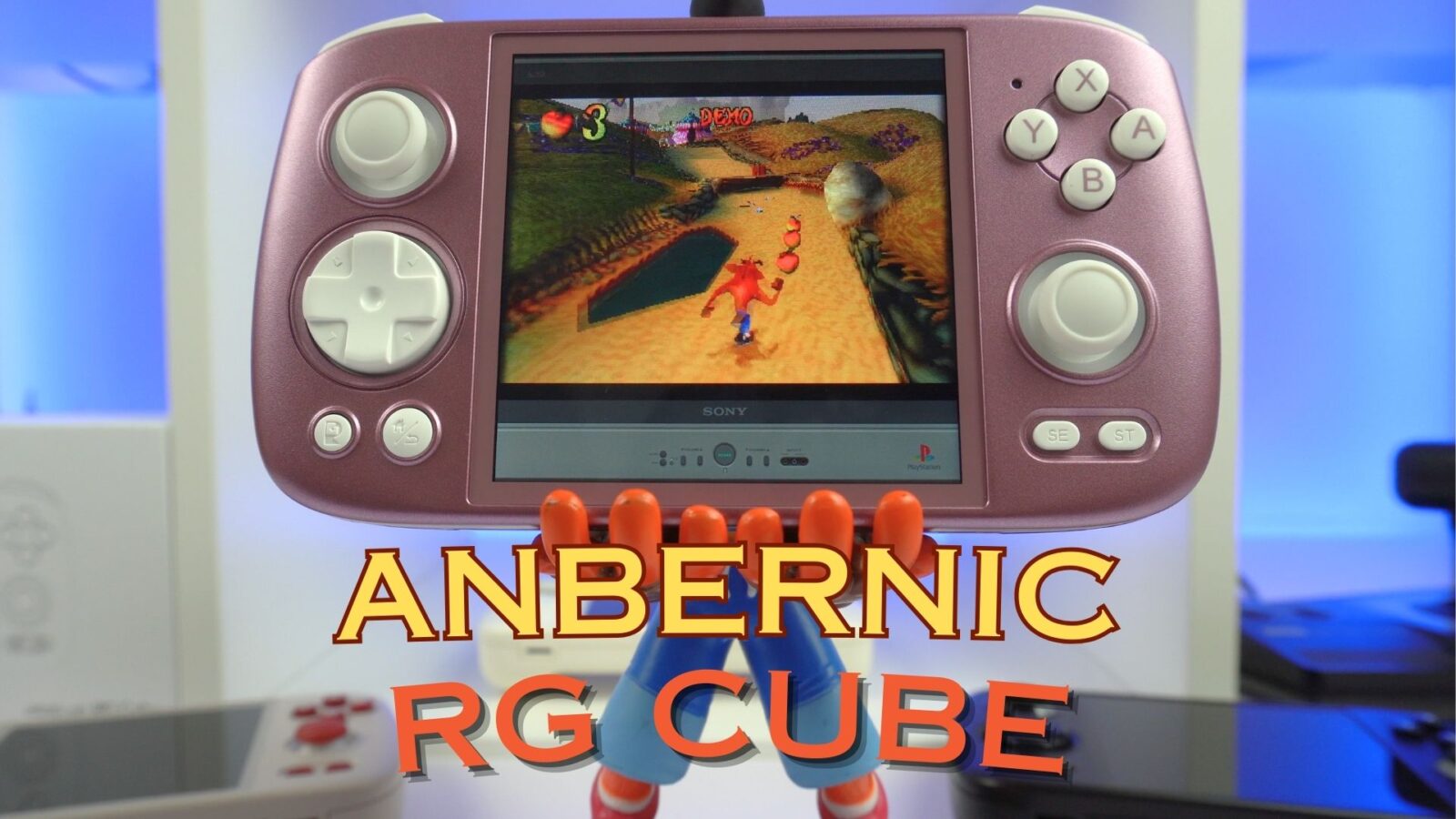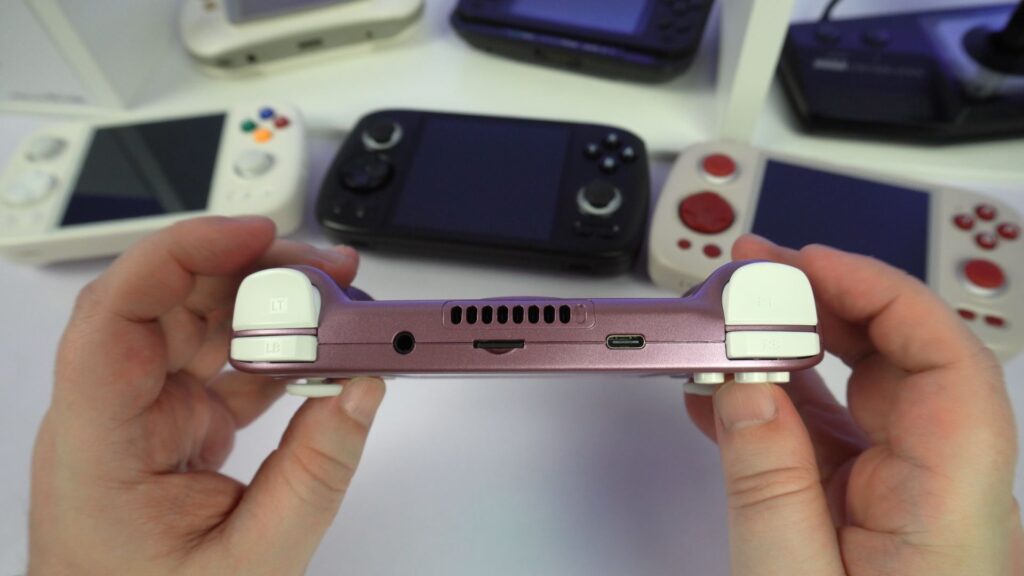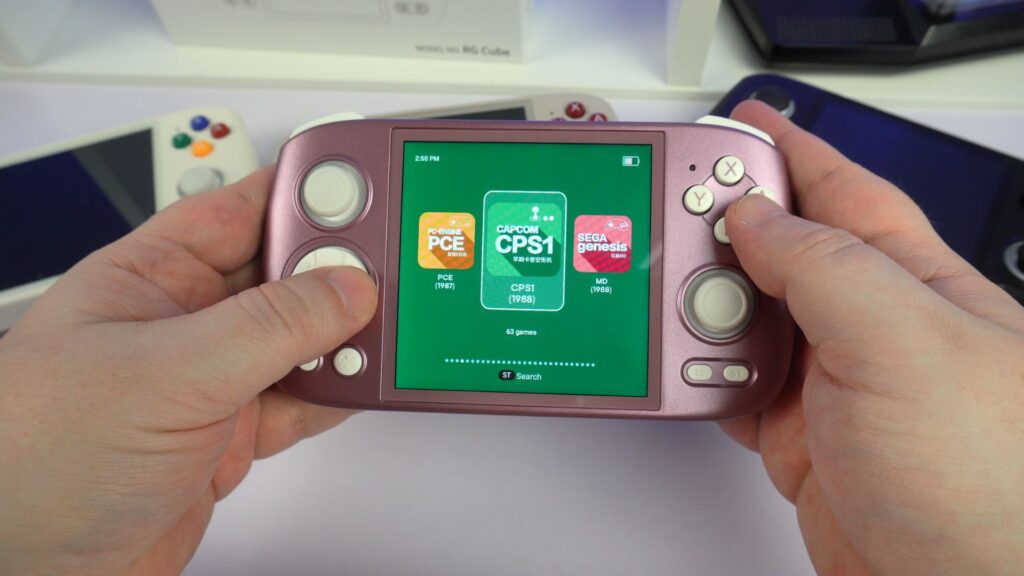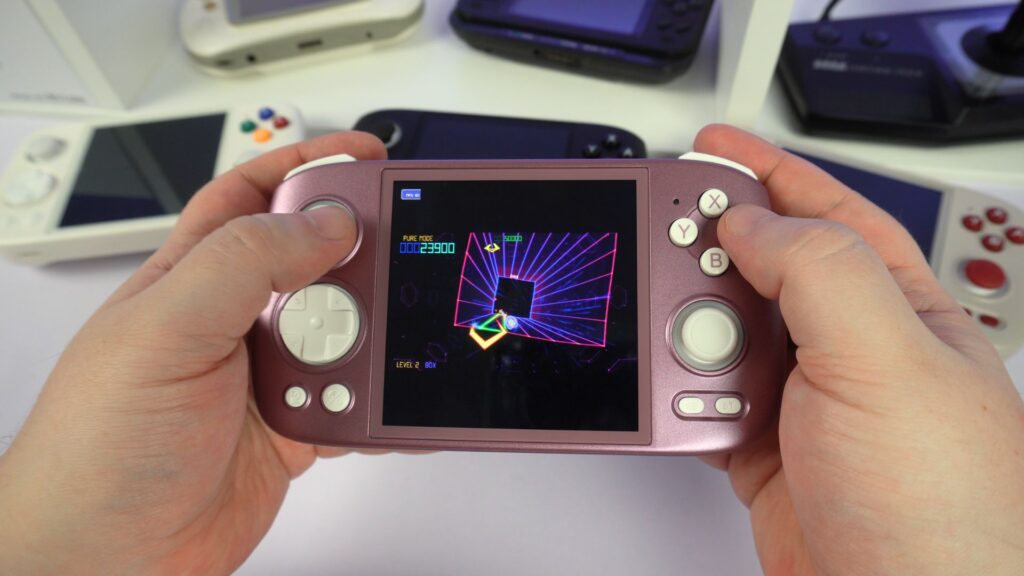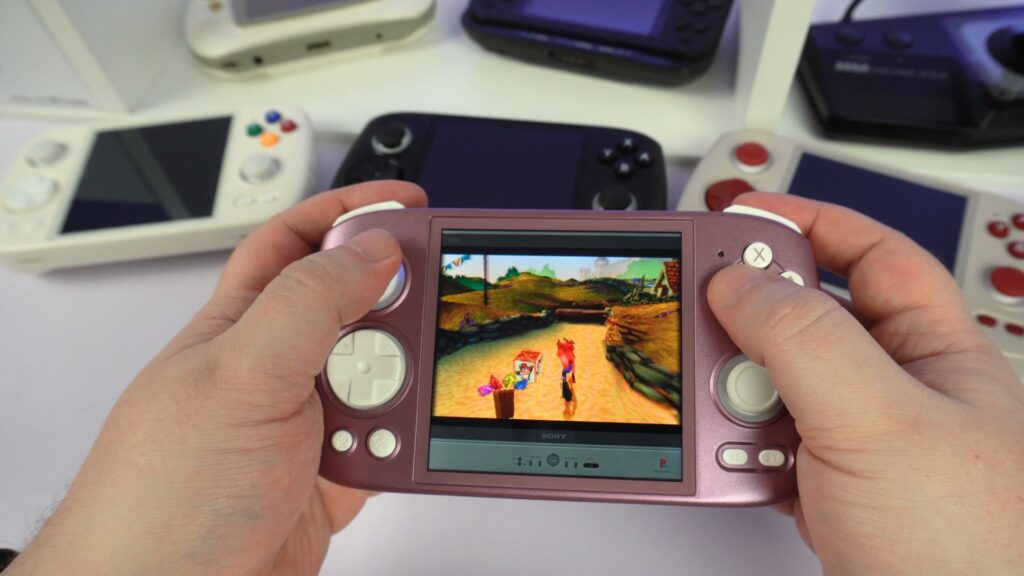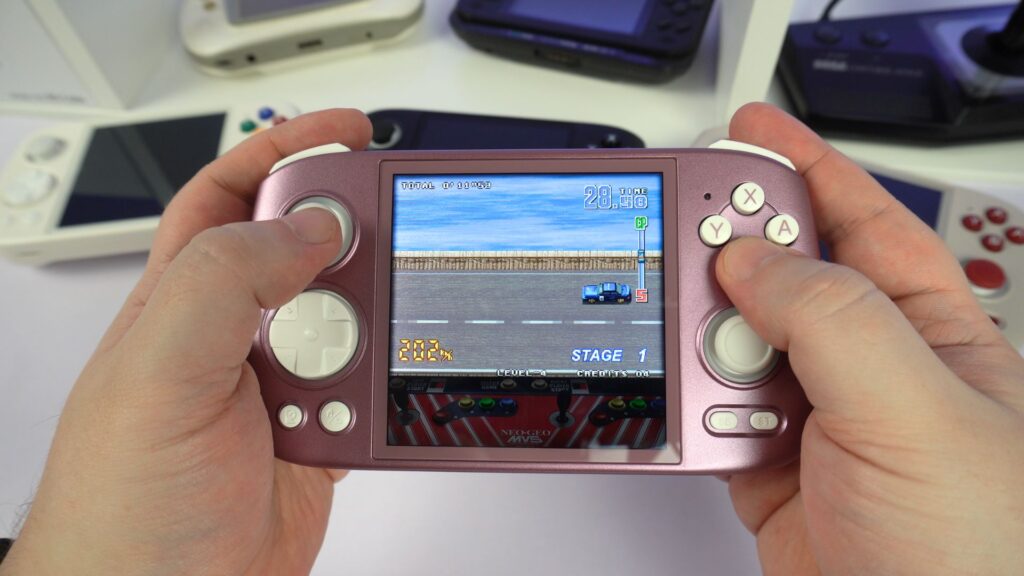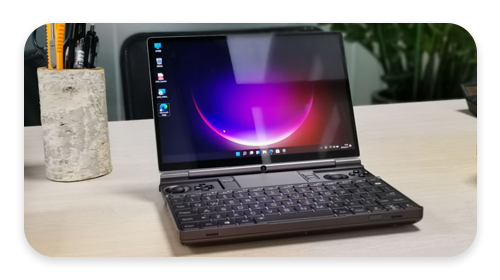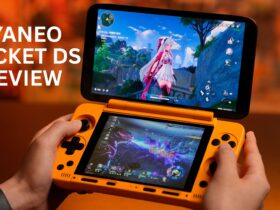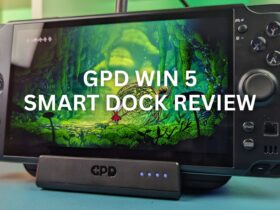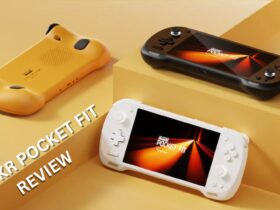Anbernic RG Cube Anmeldelse
-
Design
(5)
-
Build Quality
(4.5)
-
Display
(4.5)
-
Performance
(4.5)
-
Features
(5)
-
Software
(4)
Sammendrag
Anbernic RG Cube er en kompakt håndholdt spillenhet med en unik 3,95-tommers kvadratisk IPS LCD-skjerm, en kraftig Unisoc Tiger T820-prosessor og ergonomisk design, som gir imponerende emuleringsytelse for retrospill og moderne spill.
Totalt sett
4.6Brukeranmeldelse
( votes)Fordeler
- Unik skjerm med 1:1-format og 720×720-oppløsning
- Ergonomisk design med sklisikre grep og komfortable knapper
- God emuleringsytelse
- Grei batterilevetid
Ulemper
- Bildeformatet er ikke bra for 16:9-spill
Anbernic RG Cube Android-håndholdt spillkonsoll har vært ute en stund nå. Den firkantede skjermen er det første du vil legge merke til, det er flott for retrokonsoller, men hvordan vil dette håndtere konsoller og håndholdte konsoller med bred skjerm? La oss finne ut av det i vår Anbernic RG Cube-anmeldelse.
Anbernic RG Cube Gjennomgangsvideo
Oversikt over Anbernic RG Cube
Vi starter vår Anbernic RG Cube-anmeldelse med en oversikt. Anbernic RG Cube er tilgjengelig i fire farger: Beige White, Radiant Purple, Black og Grey. Den måler rundt 15,3 x 8,6 x 1,8 cm (6,0 x 3,3 x 0,7 tommer) og veier 260 g (0,57 lbs).
Skjermen er det som skiller seg ut på denne håndholdte enheten. Det er en 3,95″ berøringsskjerm i forholdet 1:1 med en oppløsning på 720×720 piksler. Dette betyr at den er perfekt for ekte retrospilloppløsninger som har et 4:3-format, ettersom den fyller ut mer av skjermen.
På fronten har vi alle de vanlige spillknappene, inkludert analoge hall-effektknapper. De har LED-belysning rundt seg som du kan tilpasse i innstillingene. Det er seks innstillinger å velge mellom, og jeg liker best innstillingen "chasing", som følger innspillene dine.
Det er også to ekstra knapper nederst til venstre, den første bringer deg til Anbernic-frontend, og den andre er en tilbake-knapp.
Langs toppen finner du skulder- og hall-effektutløsere. Det er en 3,5 mm hodetelefonport, micro SD-kortspor for ekstra lagringsplass og en USB Type-C-port for lading. Og på høyre side har vi strøm- og volumknapper.
Baksiden har en lett strukturert overflate som gir ekstra godt grep for fingrene. Og i det øverste området er det en grill for viften.
Anbernic RG Cube Tekniske spesifikasjoner
I den neste delen av vår anmeldelse av Anbernic RG Cube tar vi en titt på de tekniske spesifikasjonene og utfører våre egne tester av batterilevetid, viftestøy og temperatur på Android-spillkonsollen.
| CPU | Unisoc T820-prosessor, 6 nm EUV 5G SOC-brikke. 8 kjerner: 1*[email protected], 3*[email protected], 4*[email protected] |
| GPU | Quad Core Mali-G57 850 MHz |
| RAM | 8 GB LPDDR4X |
| OPPBEVARING | 128 GB UFS 2.2 |
| DISPLAY | 3,95-tommers IPS-skjerm , OCA full laminering, multi-touch, oppløsning: 720*720 |
| ANDROID OS | 13 |
| KOMMUNIKASJON | 2.4/5G WIFI 802.11a/b/g/n/ac, Bluetooth 5.0 |
| BATTERI | Polymer litiumbatteri 5200 mAh, . Støtter 5V/2A-lading, ca. 3 timer for full lading |
| STØRRELSE | 15,3 x 8,6 x 1,8 cm (6,0 x 3,3 x 0,7 tommer) |
| VEKT | 260 g (0,57 lbs) |
Vi testet batterilevetiden mens vi kjørte Antutu i en loop for maksimal ytelse. Vi fikk litt over 4 timer, noe som er svært respektabelt. For emulatorer som krever lite, kan du enkelt få mer enn 6 timer ut av batteriet.
Vi sjekket viftestøyen og temperaturen mens vi kjørte Antutu i en loop. Vi fikk en høyeste viftestøy på 55 db, og en høyeste temperatur på rundt 40 °C.
Anbernic RG Cube System Benchmarks
I systembenchmarkene sammenligner vi Anbernic RG Cube med både rimeligere og dyrere Android-spillenheter for å få en sammenligning av pris og ytelse i vår anmeldelse av Anbernic RG Cube.
Geekbench 5
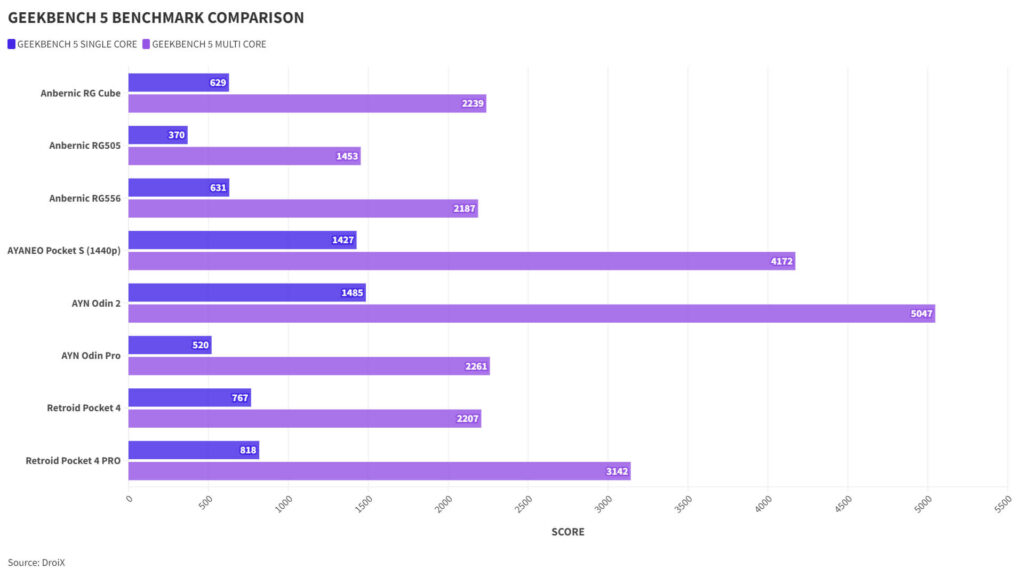
Først i testene våre er Geekbench 5. Vi ser ganske nær score til Anbernic 556-modellen som bruker samme CPU og GPU. Vi ser på rundt mid range ytelse, ikke langt unna Retroid Pocket 4 modell, les vår anmeldelse her. Totalt sett anstendig ytelse.
Geekbench 6
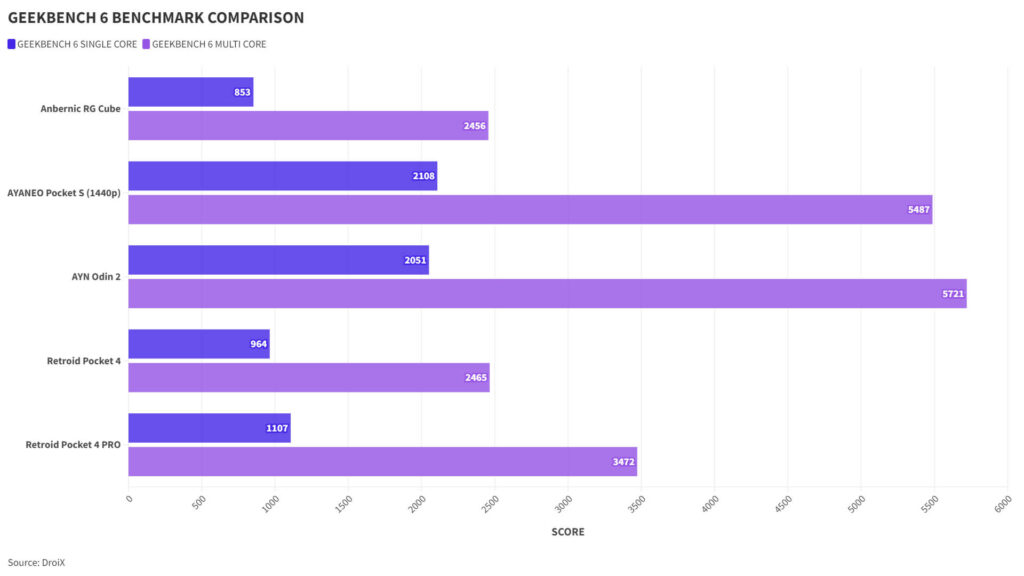
Neste test er Geekbench 6, som vi nå tester alle nye enheter med. Vi ser lavere enkeltkjerneytelse enn de andre, men på flerkjerne ser vi nesten identisk ytelse som Retroid Pocket 4-modellen. Ikke dårlig i det hele tatt.
Antutu
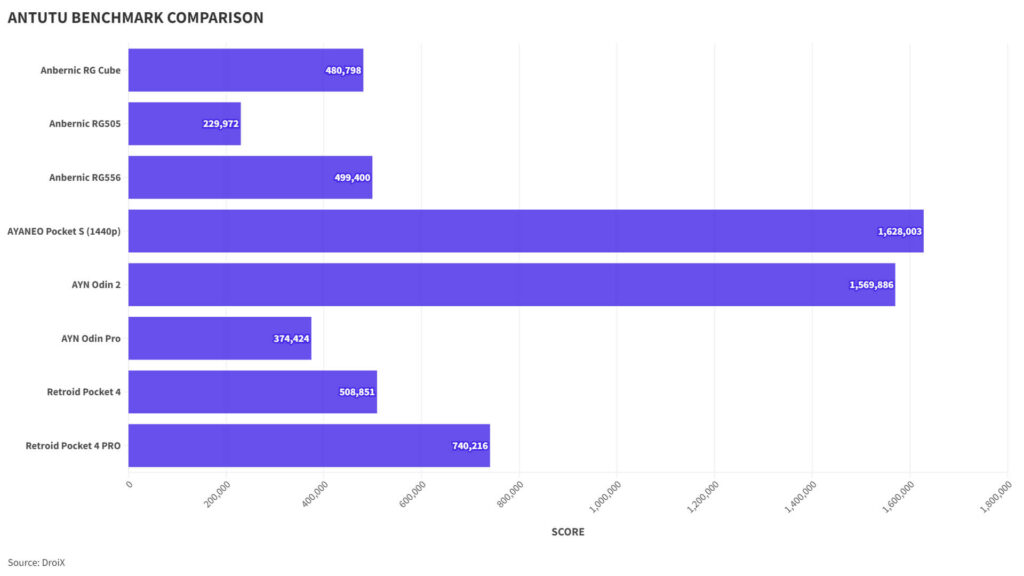
På Antutu ser vi litt lavere ytelse enn forventet enn RG556-modellen. Dette kan for eksempel skyldes benchmarking med forskjellige versjoner, ettersom 556-modellen sist ble testet for noen måneder siden. AYANEO Pocket S tar ledelsen her med sin avanserte kombinasjon av CPU og GPU.
3DMark
Vår siste benchmark er 3DMark Slingshot og Wildlife Extreme benchmarks. Vi ser gode resultater sammenlignet med RG556- og Retroid Pocket 4-modellene, noe vi hadde håpet å se. Totalt sett gode resultater igjen.
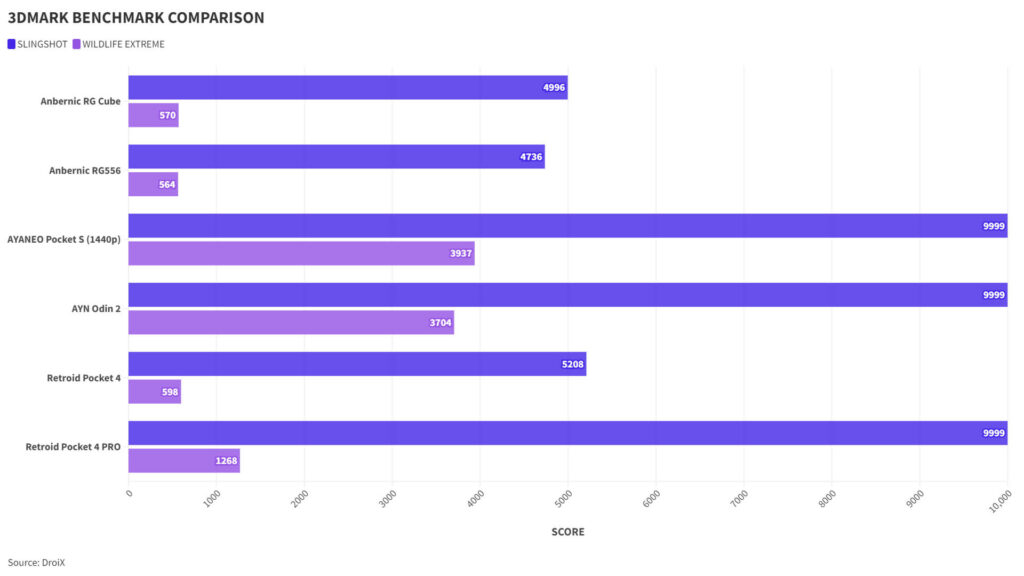
Oversikt over Android
Som en del av vår Anbernic RG Cube-anmeldelse vil vi ta en titt på operativsystemet og funksjonene. RG Cube kjører på Android 13 og har en haug med emulatorer satt opp for deg. Vi anbefaler at du logger deg inn i Google Play Store og oppdaterer alt til de nyeste versjonene, så vel som på RetroArch.
Du får tilgang til Anbernic-startprogrammet ved å trykke på knappen nederst til venstre eller fra rullegardinmenyene. Den skanner micro SD-kortet ditt etter spill og plasserer dem i sine respektive kategorier for konsoller og datamaskiner. Det er ikke perfekt, men det er raskt og gjør definitivt jobben. Du kan selvfølgelig velge å laste inn de enkelte emulatorene fra startskjermen og sette dem opp på den måten hvis du ønsker det.
Du kan selvfølgelig også spille Android-spill, jeg er ikke en stor gaming Android håndholdt spiller, men jeg prøvde noen av mine gå til spill, og de alle fungerte fint. Du har skjermkartleggingsprogramvaren som er veldig nyttig for spill som ikke har støtte for gamepad. Du tilordner ganske enkelt spillknappene til området på skjermen, og så kan du bruke kontrollene til å spille spillet. Som alltid hadde vi ingen problemer med å bruke programvaren.
Videoutgang til en ekstern skjerm støttes via USB-C. Du kan bruke en USB-C til HDMI-hub, for eksempel DroiX NH8- eller NT8-modellene våre. Eller hvis skjermen din støtter USB-C-inngang, for eksempel vår bærbare PM14-skjerm, kan du bruke en USB-C til C-kabel. Videoen vises i utgangspunktet i kvadratisk format, men du kan endre til skrivebordsmodus i innstillingene for fullskjermvisning.
Anbernic RG Cube-emuleringsytelse
I den neste anmeldelsen av Anbernic RG Cube vil vi vise ytelsen for de mer krevende emulatorene for håndholdte enheter og konsoller. Alle 8- og 16-bits systemer helt opp til PS1- og Dreamcast-æraen vil fungere helt fint på denne Android-spillenheten uten problemer i det hele tatt.
Delfin
Spillene er veldig spillbare. Vi hadde ingen problemer med begge konsollene denne emulatoren støtter.
PSP
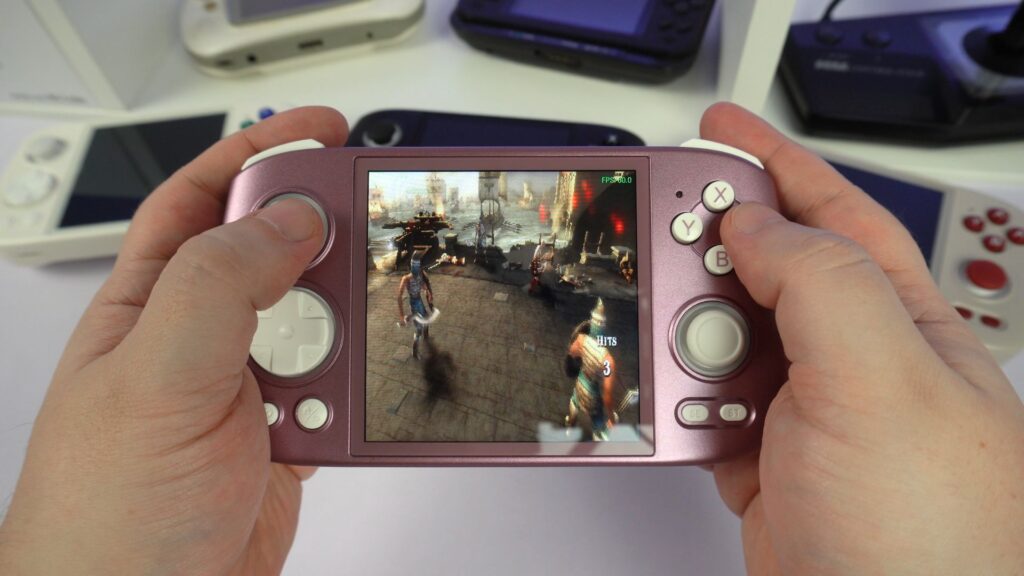

Ingen problemer i det hele tatt, for mange spill kan du øke gjengivelsen og oppskaleringen for å forbedre grafikken. Du må enten spille med komprimert oppløsning eller sette til 16:9 i innstillingene, noe som vil vise ukomprimert, men en mindre visning.
Citra
Du vil få noen forsinkelser mens du cacher shader på spill når du spiller første gang. Etter det kjører spillene generelt ganske bra. Bildeformatet er godt egnet for spilling på to skjermer.
PlayStation 2
For PlayStation 2 vil du ha en blandet opplevelse i ytelse. I Tekken Tag Tournament så vi for det meste 60 bilder i sekundet, med noen sporadiske fall under dette. I God Of War II så vi noen bildedråper, men ikke noe som ødela spillet. Og for OutRun 2006 var spillet i hovedsak uspillbart fordi det kjørte for sakte.
Vita3K
Mindre krevende spill som TxK er veldig spillbare. Mer krevende spill som Street Fighter X Tekken vil være for trege å spille, selv om du kanskje kan senke oppløsningen for å presse litt ekstra ytelse ut av det.
Yuzu
Bare 2D-spill eller spill med lave krav vil være spillbare. Alt som er mer krevende, for eksempel 3D-spill, vil definitivt gi problemer med ytelsen.
Avsluttende tanker om Anbernic RG Cube
La oss få vite i kommentarfeltet hva du synes om Anbernic RG Cube. Liker du 1:1-sideforholdet eller foretrekker du 16:9?
La oss oppsummere vår Anbernic RG Cube-gjennomgang nå med våre siste tanker om Android-spillkonsollen. Det første vi trenger å snakke om er skjermformatet. Hvis du foretrekker de eldre 4:3-formatkonsollene dine, er RG Cube perfekt for spilling. Spillene ser bra ut når de er oppskalert og har matchende rammer for mange av konsollene og håndholdte enheter.
På nyere systemer som PSP må du spille med en sammenpresset widescreen med mindre du endrer grafikkinnstillingene. Og når du først har endret innstillingene, har du et ganske lite visningsområde ettersom det justeres for størrelsesforholdet. Realistisk sett kommer dette bare til å påvirke PSP, noen PS2- og Vita-spill.
Vi ser veldig god ytelse med tanke på prosessoren. Mange PS2-spill kjører bra, men det er noen som har veldig dårlig ytelse. Med Citra ser vi de vanlige shader-cachene som henger etter på mer krevende spill. Og med Vita kjører lite krevende spill ganske bra, men henger etter med mer krevende spill. Og med Yuzu er det bare 2D-spill som kan spilles.
Anbernic RG Cube er behagelig å spille på. De strukturerte grepene på baksiden bidrar til å hindre fingrene i å skli mens du spiller. Størrelsen er ikke så verst, den får lett plass i en jakkelomme. Batterilevetiden er et stort pluss her, avhengig av bruken kan du få opptil flere timer.
Hvis du er interessert i den mer retroaktige siden av emulering, for eksempel opp til PS1 og Dreamcast osv., er Anbernic RG Cube Android-håndholdt spillkonsoll absolutt noe du bør vurdere. Den er best egnet for denne oppgaven med sitt 1:1-format og gode batterilevetid for å kjøre de mindre krevende systemene.
Du kan lese mer om og kjøpe Anbernic RG Cube her.
Det avslutter vår Anbernic RG Cube anmeldelse. Vi håper du har funnet den nyttig. Hvis du har spørsmål, er du velkommen til å stille dem i kommentarfeltet.




